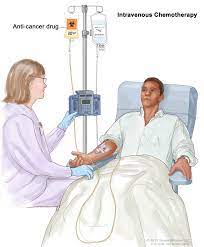Vinorelbine should be given only under the supervision of a doctor with experience in the use of chemotherapy medications.
Vinorelbine can cause a severe decrease in the number of blood cells in your bone marrow. This may cause certain symptoms and may increase the risk that you will develop a serious infection. Your doctor will order laboratory tests before and during your treatment to check the number of white blood cells in your blood. Your doctor may decrease your dose, or delay,, interrupt, or stop your treatment if the number of white blood cells is too low. If you experience any of the following symptoms, call your doctor immediately: fever, sore throat, ongoing cough and congestion, or other signs of infection.
Keep all appointments with your doctor and the laboratory. Your doctor will order certain lab tests to check your body’s response to vinorelbine.
The basics
Vinorelbine (brand name – Navelbine) is an FDA-approved first-line treatment used along with cisplatin for non-small cell lung cancer (NSCLC) that has spread to nearby tissues or other parts of the body.
Vinorelbine is in a class of medications called vinca alkaloids. It works by slowing or stopping the growth of cancer cells in your body.
Let us walk you through the key things you need to know about vinorelibine.
How should I take vinorelbine (Navelbine)?

Vinorelbine (along with cisplatin) comes as a solution (liquid) to be injected into a vein by a doctor or nurse in a medical facility. It is usually given once a week. The length of treatment depends on how well your body responds to treatment with vinorelbine.
If you experience any of the following symptoms, tell your doctor immediately: pain, itching, redness, swelling, blisters, or sores near the place where the medication was injected.
Do not stop taking Vinorelbin without talking to your doctor. You can help them by tracking your side effects in Ankr.
What are the side effects of Vinorelbine (Navelbine)?
Common side effects
- leukopenia
- neutropenia
- anemia
- nausea
- hives
- itching
- rash
- vomiting
- diarrhea
- loss of appetite
- weight loss
- change in ability to taste food
- sores in the mouth and throat
- swelling of the face, throat, tongue, lips, and eyes
- hearing loss
- muscle pain
- joint pain
- hair loss
- lack of energy, not feeling well, tiredness
- cough
- yellowing of skin or eyes
- fever
- chills
- constipation
- stomach pain
- other signs of infection
- red, swollen, tender, or warm arm or leg
- numbness
- tingling feeling on skin
- sensitive skin
- decreased sense of touch
- muscle weakness
Serious side effects
- shortness of breath or difficulty breathing
- unusual bleeding or bruising
- difficulty swallowing
- blistering or peeling skin
- dark colored urine,
- light colored stool
- chest pain
- coughing up blood
- new or worsening signs of neuropathy
Vinorelbine may cause other side effects. Call your doctor if you have any unusual problems while taking this medication. If you experience a serious side effect, you or your doctor may send a report to the Food and Drug Administration’s (FDA) MedWatch Adverse Event Reporting program online or by phone (1-800-332-1088).
Use the free Ankr platform or Ankr app to track your symptoms.
What special precautions should I follow?
Before receiving vinorelbine (Navelbine)
- tell your doctor about your allergies.
- tell your doctor about other intakes.
- tell your doctor if you have or have ever had liver disease.
- Tell your doctor if you are pregnant, plan to become pregnant, or plan to father a child. You or your partner should not become pregnant while you are receiving vinorelbine injection. Talk to your doctor about the types of birth control that are right for you.
- Tell your doctor if you have or ever had interstitial pneumonitis. Your doctor may need to stop your treatment with vinorelbine
While you are on vinorelbine or Navelbine
- If you or your partner become pregnant while you’re receiving vinorelbine injection, call your doctor. Vinorelbine may harm the fetus.
- tell your doctor if you are breast-feeding. Do not breastfeed during your treatment and for 9 days after your final dose.
- you should know that vinorelbine may cause constipation. Talk to your doctor about needed precautions and treatments.
In case of an emergency/overdose
In case of overdose, call the poison control helpline at 1-800-222-1222. Information is also available online at https://www.poisonhelp.org/help. If the victim has collapsed, had a seizure, has trouble breathing, or can’t be awakened, immediately call emergency services at 911.
Symptoms of overdose may include:
- sores in the mouth and throat
- stomach pain
- constipation
- fever
- chills
- other signs of infection
- loss of the ability to move muscles and to feel a part of the body
What special dietary instructions should I follow?
Your doctor may tell you to be sure to drink enough of water, and eat high fiber foods such as lettuce, spinach, broccoli, squashes, beans, nuts, seeds, fruit, whole wheat bread, whole wheat pasta, or brown rice. Be sure to follow the instructions carefully.
Brand names
- Navelbine®¶
Other names
- Didehydrodeoxynorvincaleukoblastine
¶This branded product is no longer on the market. Generic alternatives may be available.
Last Revised – 12/19/2023, FDA-updated- 5/31/2022, SG
Get 24×7 support for vinorelbine (Navelbine)
Don’t go through your cancer journey alone. Use Ankr to:
(1) find the best treatment for your cancer, and
(2) get advanced warning to cut side effects by upto 52%
